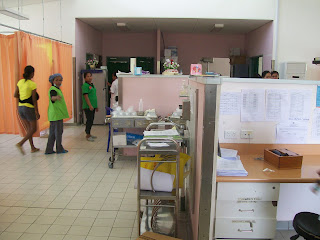
I've been in Dili just over a week now, and it's been quite an experience. It is in some ways a typically poor Southeast Asian town, with shabby little huts, open drains, burning piles of rubbish and stray dogs wandering about. What is unique about Dili is the overwhelming presence of the UN. The place is swarming with expats, and I estimate that about half of the expats I've spoken with are from the UN. The rest fall into the same category as me, which is volunteer for an NGO. I counted cars one afternoon out of curiosity - 1 in 10 vehicles that drove by were white UN vehicles. Many of the other vehicles were little yellow taxis, government vehicles and vehicles belonging to international aid agencies. Very different from other places I've been recently.
The UN are visible in the streets, particularly the UN police, of which there seem to be hundreds. The Timorese police and their military are also present in large numbers. The presence of all these uniformed men and women, coupled with the burnt-out buildings, is a constant reminder that there has only been peace in Dili for a relatively short time. Friends give me dire warnings about not venturing out after dark, and for now, I will take them at their word.

I'm volunteering with a local NGO called Alola Foundation, which focuses on improving women's and children's health, education and economics. East Timor has the 2nd highest maternal mortality rate in Asia, after Afghanistan, and my job is to write and edit proposals to seek grants from donor agencies for projects to address maternal and infant mortality. I've visited the Dili National Hospital and the Bairo Pite Clinic. These are the two places where women can give birth with the aid of trained personnel. The maternity ward of the Dili National Hospital, shown below, is clean and well-maintained, and the staff are committed and well-trained.

The problem is that there are so few beds and the staff are so over-worked. There are only two obstetricians in the entire country. Sometimes the maternity ward is so full that the staff lay mattresses on the floor of the ward, or in the corridor, and women give birth there. Women and their babies are usually sent home in less than 24 hours, to make room for the next ones. There are so few places like Dili National Hospital that only about 20% of women can deliver their babies in any kind of health facility. This is a major contributor to the very high death rate for mothers and their babies.
In my time off from work, I mostly go scuba-diving, or sit in the bar of the pub with other scuba-divers talking about scuba-diving. East Timor has some brilliant dive sites. The coral at Christo Rei (one end of Dili harbour with a giant statue of Christ on it) is the best I've seen. Since it's wet season, the visibility is not great (3-6m or so) but what we can see close up is outstanding. I wish I had Lyndal's underwater camera to show the sites and sights. You might like to visit this website and look at their photos.
Other than working, diving, chatting in bars and swimming, there are the usual bizarre expat activities of quiz nights, karaoke and cards (not at the same time). These are not things I would usually do at home, but then I don't scuba dive much in Canberra either. :-)
Today I am heading off to the mountains to visit the home village of my friend Macu. There is no electricity, mobile coverage or internet, and not really much of a road either. It will take us 8 hours to get there. This will be interesting!
No comments:
Post a Comment